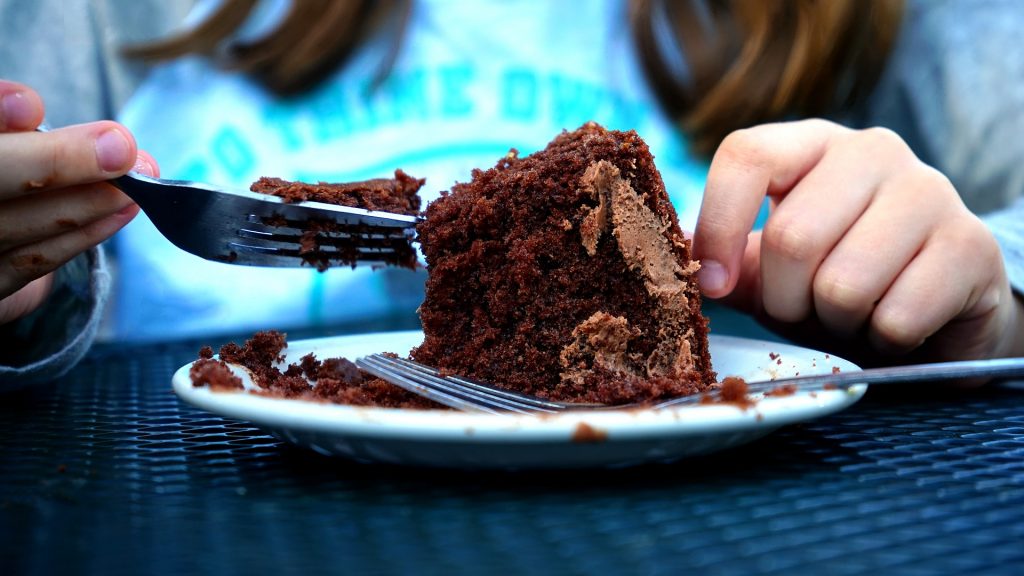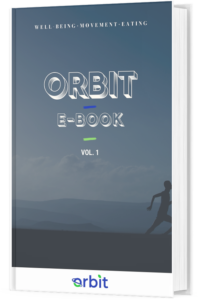Making peace with food signifies that you do not have forbidden foods, that you have an unconditional permission to eat, and that feelings of guilt in relation to food are minimized.
Intuitive Eating1 is a book, created by Evelyn Tribole and Elyse Resch, that presents 10 principles to create a healthy relationship with your food, body, and mind. The 10 principles build upon one another. Work on every principle one by one. If you have not read the Principle #1, or # 2 please refer to them before getting into this article.
The Deprivation Backlash1
Have you ever experienced the “Last Supper” effect? This is when you overeat a food that is forbidden, and consequently experience guilt: “For one Last Supper I will eat desert, then tomorrow I stop. No more deserts.” A few years ago, I decided to stop eating added sugars. It worked well for the first year. I thought I was different! However, after a year, I decided to eat one piece of chocolate. Since I had eaten one piece, I told myself “rather eat the whole bar before going back to no added sugars tomorrow.” That night, I ate the whole bar, and consequently, experienced guilt and cut out added sugars until the next time I “lacked discipline.” This cycle happened on and off for approximately one year until I finally went to see a registered dietitian who recommended for me to stop depriving myself from added sugars.
Depriving Heightens your Desire
The lesson learned was that depriving foods may work for a year or two, however, with time, a craving will settle in and your body will do everything it can to get ahold of that food.
Something important to note is that I love chocolate, and thought that depriving it would be the only solution to “control” that love. However, this is where I was mistaken. Depriving something you want, heightens your desire for it.
“The moment you banish a food, it paradoxically builds up a “craving life” of its own that gets stronger with each diet, and builds more momentum as the deprivation deepens.”
Tribole and Resch, 2012, p.75
Subtle Forms of Deprivation1
You may not be a chronic dieter who consciously deprives specific foods. However, you may find yourself overeating due to specific circumstances. Here are a few examples, of which you can become aware:
1. Food competition
If you were part of a family with several kids, you might have found yourself in a food competition with your other family members. When the bowl of chips was put onto the table, you gobbled down as much as you could before the other family members ate the whole bowl. The fear of not getting your share of food can translate into a fear of deprivation that follows you throughout life. As a result, when food is available, you take it as fast as you can without checking in with your body to evaluate whether you are hungry.
2. Returning Home
When returning home to foods you loved at your parent’s home, you might find yourself overeating them. If you have been in a student apartment with the cheapest food in the grocery store, your parents’ praliné chocolate, or fancy cheese may seem particularly appealing.
This returning home effect might also happen when returning from a trip when foods you loved were not available. After returning home from a country in which fresh fruits and veggies were not available, you might find yourself craving them when you get home.
3. Great Depression Eating
The scarcity of food during the Great Depression impacted the value attributed to food in several families. Families did not dare waste food out of fear of it becoming unavailable. This tradition of having to “clean your plate” continued throughout the years. This tradition still exists today as it passed on from one generation to the other. If cleaning your plate becomes a habit, you may lose touch with your fullness cues as you are focused on finishing your plate. Be aware that the habit of finishing the food that is in front of you may also be used with whole bags of chips, or boxes of cookie.
Research on Restrained Eating1,2,3
Several studies have shown that dieters consistently exhibit the counter regulation effect. For example, one study made participants fill in a questionnaire to identify whether they are considered restrained eaters, or not. Then, participants were given a “preload”, which was either 500 ml of chocolate milkshake or 500 ml of chilled limewater. After this, each participant was given a bowl of 21 cookies and were asked to taste-test them. Participants were told that they could eat as many cookies as they wanted and were put in separate rooms to not feel self-conscious.
Results of the Study
As a result, the dieters exhibited the typical pattern of counter regulation: Dieters who were preloaded with the milkshake ate significantly more than dieters who were preloaded with the lime water. Contrarily, the non-dieters who were preloaded with the milkshake naturally regulated their eating and ate less than the non-dieters who were preloaded with the lime juice. This phenomenon is found in study, after study.
The Key to Making Peace with Food: Unconditional Permission to Eat1
If foods are forbidden, the seesaw syndrome will keep on occurring. Imagine a seesaw with deprivation on one side, and guilt on the other. You go up and down, from feeling guilty, to feeling deprived. When deprivation is at the top of the seesaw, your cravings will become stronger, and you will inevitably overeat. Overeating triggers the seesaw to tip. Guilt is now at the top of the seesaw as you have given into your forbidden foods. The seesaw will keep playing with your mind and body until you give yourself unconditional permission to eat.
Unconditional permission to eat signifies that you do not restrict any foods, and you eat what your body really wants.
This may seem crazy. The goal here is for you to develop a sense that all foods are emotionally equal: For fuzzy candy peaches to become emotionally equal to real peaches. This means that fuzzy peaches are not considered to be “junk” food. You can call them “fun foods”, or “play foods” to help you in this process.
If you have forbidden a food for so long, and decide to eat it everyday, you may realize that you really do not feel like eating that food everyday. You are going to want those real peaches sooner than you may think! The forbidden food becomes a lot less compelling once it is no longer forbidden. Yes, you may overeat that food in the beginning stages, but after repeated exposure, your body gets used to it. How?
Habituation4
Unconditional permission to eat is based on the premise of habituation. Research has shown that habituation is related to the amount of food consumed, and the cessation of eating. With repeated exposure to a specific food, the amount consumed diminishes. For example, one study looked at the long-term habituation of food in obese and nonobese women. This study found that when given the same food everyday, over five weeks, there was an increased rate of habituation and a decreased calorie intake in comparison to the group who was exposed to that same food once, weekly.
Tricks to make the Process Easier (from Abbey Sharp, a registered dietitian)5:
- Make a list of all your forbidden foods.
- Buy one forbidden food at a time and give yourself unconditional permission to eat it.
- As you eat the now “allowed food”, check in with yourself as you eat it. You can ask yourself: “Is this the flavour I remember?”, or “is this food as delicious as I imagined it to be?”
- Once that food has lost its thrill, move on to the next item on your list.
Side note: You may be somebody that has enough knowledge to make choices about certain foods based on their nutritional facts. For example, you love chips, but you also love homemade pita chips. You decide to opt for the pita chips. Choosing the pita chips does not mean that you deprive yourself of chips or that chips are forbidden. You simply decided to choose a snack that was a bit lower in sodium but will be just as satisfying for you. Giving yourself unconditional permission to eat does not mean you cannot think of healthier alternative. It means that if you absolutely want the chips, and pita chips are not of interest, then eat the chips. Eating those chips would become necessary if you are thinking about chips all the time and find yourself binge eating chips every time you break your “no chip rule.”
However, for chronic dieters, Tribole and Resch (2012) tell readers in their book that “if nutrition were the overriding priority now it would only perpetuate your restrictive thoughts” (p.88). As mentioned above, the principles build upon each other, and for chronic dieters, nutrition content cannot be the driving force at this stage because it may simply become another “food rule”. For non-dieters, the side note may be of interest.
Do not forget to check-in
When working on this principle, do not forget to check in with your body and to acknowledge your hunger and fullness cues. If you understand this principle as “Free For All Eating”, please be aware that you may experience physical discomfort resulting from eating past your fullness. Noting that this sensation is unpleasant is great step toward becoming an intuitive eater.





